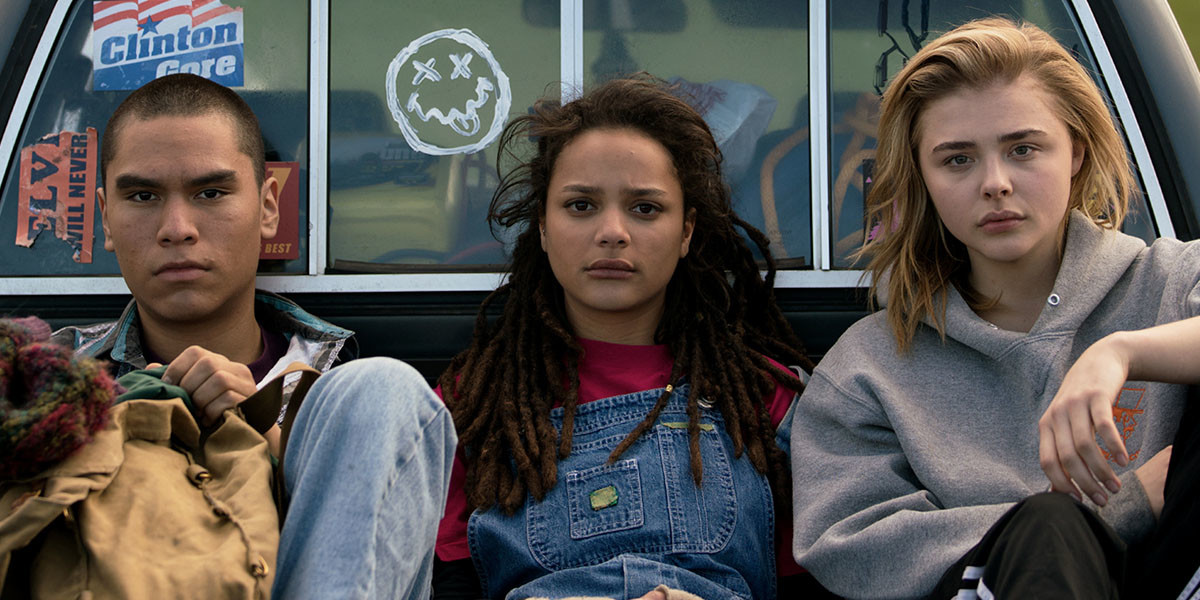
MPAA Rating: R | Rating: ★★
Release year: 2018
Genre: Coming-of-Age, Drama Director: Desiree Akhavan
At first glance, The Miseducation of Cameron Post is a film I should love. An indie darling–it won the Grand Jury Prize at Sundance this year–and a coming-of-age story directly addressing Christian spirituality and practices, it’s situated right in my youth-pastor-turned-theologian-and-film-critic sweet spot. I grew up in a similar Christian subculture, and have had friends who experienced the type of gay conversion therapy displayed here. Yet like a previous Sundance-winning teen film with an overlong title, Me and Earl and the Dying Girl, I left the theater disappointed and underwhelmed. Cliche-ridden and strangely aloof, Miseducation elicited little in the way of an emotional response from me beyond frustration.
Set in 1993, Miseducation centers on the titular Cameron, portrayed with muted ennui by Chloe Moretz. Moretz floats through this film in a daze, giving us little to connect with or understand of her character’s motivations or internal struggles. Some might say that’s in her character’s nature; she’s a gay high school athlete who also attends Bible study, and has suffered the trauma of losing both her parents to some unmentioned accident. Of course she’s quiet and detached! Still, there is a difference between a withdrawn character and a poorly-drawn one; Cameron is not so much a character as she is an avatar for the audience to experience the Christian gay conversion therapy camp she is forced to attend after she is discovered with her lover, Coley (Quinn Shephard) on homecoming night.
Upon arriving at God’s Promise, she is greeted by dour fellow “disciple” Jane Fonda (Sasha Lane), who introduces her to the bubbly Reverend Rick (John Gallagher Jr.), an ex-gay man (not actually a reverend, from what I can tell) who co-leads the camp with his coldly sinister psychiatrist sister, Dr. Lydia Marsh (Jennifer Ehle). All of these characters are mostly stereotypes, yet without the exaggeration of satire to give it levity and bite (think Saved!), Miseducation portrays them with a bland pseudo-authenticity. It all looks and sounds kinda familiar even as it spirals into the melodramatic. But it’s both too familiar (read: boring) and too overplayed (read: mawkish). Of course Cameron’s roommate Erin (Emily Skeggs) is a die-hard disciple who might also be attracted to Cameron. Of course Jane and her outsider pal Adam (Forrest Goodluck) are the rebels who grow weed in the woods to smoke in the basement. Of course there is an awkward singing/dancing scene. Of course Dr. Marsh is a sociopath who doesn’t understand teenagers and spouts terrible theology and psychology. Of course the teens aren’t “cured” of being gay. There were very few surprises in terms of plot structure, character development, or emotional beats to hold my interest; it’s like the film cut ties with any emotional anchors right from the beginning. The strongest moments are the flashbacks/dreams Cameron has of Coley, where she (and the camerawork) seems the most alive and authentic. Unfortunately, none of these flashbacks go beyond the romance, portraying Cameron as a one-note character who is entirely defined by her sexuality rather than her whole being and experiences (such as the death of her parents or her relationship with her conservative aunt).. Everything at the camp onward–the bulk of the film–is a plod towards the inevitable climax, one which I imagine you could guess right now if you’re familiar at all with stories about LGBTQ teens dealing with emotional abuse.
A mild spoiler: the image being widely used for the film’s marketing–the three teens in the back of the truck seen above–is actually the final scene in the film. Nothing quite as adventurous or thrilling occurs prior to this scene. Indeed, Miseducation is a bit like The Perks of Being a Wallflower without the vibrancy of Ezra Miller, the charm of Emma Watson, or the earnestness of Logan Lerman. In a scene from that film, as the main character is riding in the back of a truck, he stands up and lets go, embracing the rush of the future with abandonment and verve. In Miseducation, the characters remain seated, staring backward into the distance, unmoving and seemingly unmoved. It’s not that Miseducation needs to be more like Wallflower to succeed; each film has its own merits and approach to the adolescent question of identity. It’s that Miseducation‘s filmic identity is so unclear and relies upon tropes to provide any clarity; it’s as if the film were a teenager, trying to figure out who she is in the midst of the surrounding culture’s pressures. And I love that about teenagers. I love that they are in process, malleable and romantic, full of potential and hope. But this is a teen film, not a teen. I only wish I loved The Miseducation of Cameron Post more.
IMDB Listing: https://www.imdb.com/title/tt6257174/
Leave a Reply